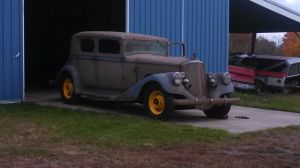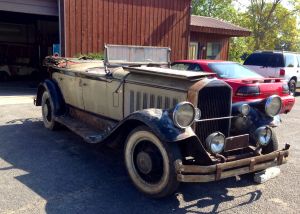- Home
- About Us
- Join/Renew
- Member Benefits
- Member Pages
- Log In
- Help
- Museum Store
I own a 1929 Model 133 Convertible. At a recent meet a judge asked me how many had been built and an estimate of how many still exist today. Does anyone have any idea? I know that somewhere around 10,000 cars were sold that year (all models), but have no clue to my specific model.
For that matter, can any of our erudite Pierce historians tell me how many Pierces were make in total (maybe less trucks) from beginning until 1938, and how many Pierce Arrow cars are in existence today? It would be interesting to know the survival rate.
And wouldn’t it be interesting to break that question down to year-by-year? Not only numbers produced in each year, but what percentage of those produced survived from each year.
Ask and ye shall receive. Series 133 201 built, eight still with us. Series 143 205 built, 9 remain. Please understand one of the series 133 is a very terrible basket case. Ed
Survival of old cars is an interesting subject. WWII scrap drives
insured that we wouldn’t have to count so high. Somewhere I was informed
that only 1% of the early cars survived. Of course this is a rough
figure. I usually double the figure that I know of to compensate for
the ones that I can’t know of. As time passes, “known cars” may become
a firmer count. ’20’s cars may need a higher %, and ’30’s cars survival
may have been helped by WWII due to the lack of new cars. We have the
benefit of car clubs, car museums,car libraries and the car
addicted like Mr. Minnie or others of like stature in our Club, to
answer questions like Edward’s.
In the back of the 2014 Roster it is stated, 85,790 Pierce-Arrow
cars were built. Survivors that the Club is aware of( vehicles in our
data base, regardless of whether the owner is a current member of the
Society; includes small % of incomplete vehicles), equals 2,489 cars.
The estimated survival rate of passenger cars is 2.9%. 110 trucks are
known of.
This is actually a rather tough question to hope to answer accurately. After bankruptsy, Pierce Arrow paperwork, records, design plans, blueprints etc were hauled away by the truckful for scrap paper, there is no way to accurately state production figures.
When a person looks through a PAS Roster, and looks at the serial numbers, engine numbers and tries to get a feel for the number of cars produced, it sure seems to me that Pierce added some rounded up serial numbers to the production lists. The earliest series 80 in the old roster I just looked in is 801213, I highly doubt that it is the 1213rd car produced, more likely it is the 213th car produced. And this seems to happen several times in the roster lists,
So, while I’m sure that there have been more accurate accounting attempts than just subtracting the first number from the highest serial number known. I’d think searching licensing records for the various states where Pierce cars were sold might have at one time been helpful, but that was in the days of dusty basements full of boxes of papers.. What a daunting task.
Then, for estimatiing the number of cars that have survived, I’d say that too is difficult at best. There are still, newly found, previously unknown, unrecorded Pierce Arrow cars being discovered. Some are barely restorable hulks, some are able to become a driver with a bit of work.. Some are rare body styles, others more mundane. But any Pierce Arrow brought back out into sunlight is to be treasured.
I’d think that the ~2500 cars that are known, those that have at one time been recorded with one or more collector car clubs over the years, I think at least 10% should be added, or possibly more. Cars are still being pulled from old garages, storage buildings, barns and parking structures.
This is obviously just my opinion. But we are not a very low production car like a Duesenburg where every serial number is known and most if not all are accounted for. I’m hoping that there are at least several hundred undiscovered Pierce Arrows still waiting to see the light of day again.
This 1933 836 Club Sedan was parked 50-60 years ago. Amazingly complete car, I think the missing parts count is less than five. Only missing running board trim pieces and one locking sidemount hubcap.
Greg Long

The 85,790 total production number was credited to Bernie Weis in an
article he wrote for the Arrow 2002-3.
If you look on the main menu under tools, you will find the identification guide which may answer some questions. Enter in S/N 801001 which is the first production Series 80. You will see that the factory assigned blocks of serial numbers. The entire block may or may not have been used. The next column states the highest recorded serial number as a reference.
Concerning the 1929-38 cars, by entering in your VIN or S/N, you will find the production by body style. This data was established using reported data so it is not absolute.
Paul,
Thanks for the clarification and the direction to the Identification Guide.
I stand corrected about the screwy numbering system.
It was screwy!
Excellent information.
Thanks again,
Peter
Quote: Regarding Greg’s comment about serial numbers, it is true that PAMCC had a screwy numbering system during some years, however it was not so with the Series 80. It is quite realistic to consider that the Serial Number 801213 accurately reflects that Greg’s Series 80 was the 1,213rd Series 80 produced.
My Series 80, Seven-Passenger DeLuxe Sedan is # 805121 with an engine #: 806220.
Greg’s car is older than mine by about 1,900 cars. unquote
Serial # 801213 is not my car, as I said, it is the earliest Series 80 listed in the roster at hand.
If a person looks at the Series 80 serial numbers, there are cars about every 40-200 serial numbers, it seems highly unlikely that ALL the 800001- 801000 cars disappeared or were scraped, and the earliest survivor is # 1213. Since there is a random car listed from 801213 up through 809151 I’m sure the numbering started at 801000.
The earliest car I see in the roster is 801213, Peter’s car is 805121, that is a spread of 3908 cars or numbers.
Greg Long
For Series 80, the Company did indeed screw the pooch as to serial numbers (see below–taken from an unknown ancient PAS Service Bulletin). I don’t think the Company did this on any other model.
1924-25 801001-801250 250 cars
802001-802500 500 cars
803001-803500 500 cars
804001-804500 500 cars
805001-805500 500 cars (21” wheels begin 805443??)
806000-806999 1,000 cars
807000-807999 1,000 cars
1926 808000-8015609 7,610 cars
1927 8015610 and up (20” wheels begin here)
Note that substantial blocks of numbers were skipped until 80-6000, after which the numbers appear to be honest.
Reason? We can only speculate… Perhaps to make Branhams and other such companies think that more cars were being sold than actually were–but when the S80 became a success there was no longer a reason to fudge…
For What It May Be Worth….
The Old Curmudgeon
to add to this discussion, fellow PAS member miles morstatter passed a copy of the jan-feb 1974 issue of “The Horseless Carriage Gazette” along to me with a chart compiled by harlen e appelquist listing PA production as follows
1901 190 1920 2040
1902 380 1921 1050
1903 475 1922 1685
1904 385 1923 1850
1905 400 1924 2280
1906 425 1925 6250
1907 450 1926 5550
1908 520 1927 5985
1909 585 1928 5950
1910 618 1929 9618
1911 825 1930 7200
1912 950 1931 4687
1913 1040 1932 2870
1914 1140 1933 2350
1915 1300 1934 1875
1916 1500 1935 905
1917 1800 1936 790
1918 1168 1937 145
1919 1590 1938 3
that adds up to a total production of 78,824 using his numbers. there is no source reference given by him.
If these numbers were correct, somehow P-A’s were able to act like healthy rabbits. We now have 5 more 1938’s listed in the current roster than were originally made!
Hi all!
If 201 , 133 were built. Does anyone know how many of them were DC phaetons? How many DC’s are still with us?
Rick. ( I know of one 

I am in the process of trying to reconstruct the production sequences for the Series 3 cars of 1914-1915 and it is quite interesting.More to come later.
